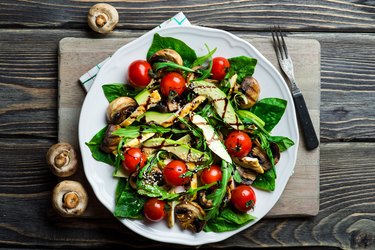
Salads and fruit are great for you — and they're worthwhile to add to a weight loss diet. However, eating only salads every day can get boring, and it might keep you from getting some other important nutrients.
Tip
You would likely lose weight eating only salads every day but you may also be depriving yourself of essential nutrients you need to feel and look your best.
Video of the Day
Benefits of Eating Salads Daily
Even though salads and fruit shouldn't make up your whole diet, they are low in calories and great sources of vitamins and minerals. For example, fruits and veggies are packed with vitamin C, an essential nutrient that keeps your hair and skin strong and acts as an antioxidant to protect your cells from oxidative damage.
Video of the Day
They're also a source of potassium — a heart-healthy mineral that can lower your blood pressure. The National Institutes of Health recommends eating eight or more servings of fruits and vegetables each day as part of the DASH diet to reduce blood pressure.
Jumping on the salad diet bandwagon is a great way to bump up fiber, which helps you feel satisfied after your meals and helps move food through your system to avoid constipation.
Perhaps the greatest benefit of eating salads daily is that you might live longer. Research published in the February 2017 International Journal of Epidemiology found that people who eat more fruits and vegetables (including salad) have a lower risk of death of all causes. In fact, there's about a 10-15 percent reduction in risk for every 200 grams (about 7 ounces) you eat.
Read more: 23 Salads Nutrition Experts Eat
Not Enough Protein
A major downfall of eating only salads every day is that fruits and leafy green salads fall short on protein. You need protein in your diet to provide amino acids, which your body uses to maintain healthy tissues, to boost your immune system and to help transport oxygen via your blood. A fruit and salad diet can be healthier if you mix in some protein like hard-boiled eggs, grilled chicken, beans or tuna.
Eating only salads and fruits means you'll miss out on the weight loss benefits associated with a higher protein diet. Upping your protein intake can help reduce your appetite, eat fewer calories and maintain a healthier weight, according to an April 2015 review article in the American Journal of Clinical Nutrition.
If you eat only salads every day, your body may start breaking down muscle tissue to get the amino acids you would normally get from protein your diet. Ironically, that can make it more difficult to lose weight; since muscle tissue is so metabolically active, losing muscle tissue reduces the number of calories you burn each day.
A Healthier Salad Diet
If you want to follow a salad diet, pack your salads full of healthy ingredients. Combine your leafy green salads and fruit with lean proteins and whole grains for the greatest health benefits. Try serving a delicious kale salad with a 3-ounce serving of grilled salmon and a half-cup of brown rice or quinoa or chop your apple into bite-size pieces and serve it on top of a portion of rolled oats or spelt flakes.
When you're craving salad for your lunch or dinner, add lean protein and healthy fats for a more filling meal. Chopped grilled chicken or turkey breast, tofu, chickpeas and beans, all provide protein to help fill you up. An ounce of nuts can add fiber and healthy fat, plus a satisfying crunch.
Another option instead of the salad diet all day, every day, is eating only salad once a day. If you're eating a salad-based meal once a day, that still means you can work your grains, protein and some dairy foods in the rest of the day. This is a great way to add vegetables and fruits to your diet but still keep things balanced and interesting.
Read more: Healthy Ways to Lose Weight Fast
If you find yourself gravitating toward highly restrictive weight loss diets — such as those made up entirely of salad and fruit — consult a professional to help you find a healthier way to lose weight. For a personalized eating plan to help you reach your diet goals safely, consult a registered dietitian.
- National Institutes of Health: National Heart Lung and Blood Institute: "DASH Eating Plan"
- American Journal of Clinical Nutrition: "The Role of Protein in Weight Loss and Maintenance"
- International Journal of Epidemiology: "Fruit and Vegetable Intake and the Risk of Cardiovascular Disease, Total Cancer and All-Cause Mortality—a Systematic Review and Dose-Response Meta-Analysis of Prospective Studies"